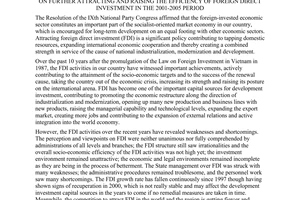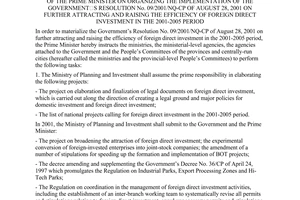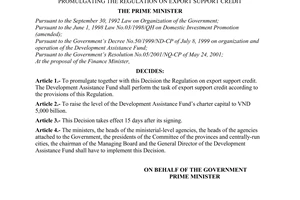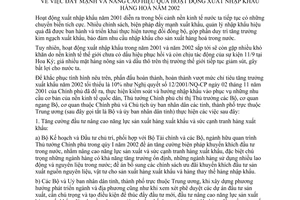Nội dung toàn văn Dirrective No. 31/2001/CT-TTg, on raising the efficiency of goods import and export activities in 2002, promulgated by the Prime Minister of Government.
|
THE PRIME MINISTER OF GOVERNMENT |
SOCIALIST REPUBLIC OF VIET NAM |
|
No: 31/2001/CT-TTg |
Hanoi, December 13, 2001 |
DIRECTIVE
ON RAISING THE EFFICIENCY OF GOODS IMPORT AND EXPORT ACTIVITIES IN 2002
The import and export activities in 2001 took place in the context where the national economy saw positive changes. Many policies and measures to efficiently step up export and manage import had been promulgated and applied in a relatively synchronous manner, thus contributing to maintaining the export turnover growth and ensuring the import demand for domestic goods production.
However, the import and export activities in 2001 as well as in 2002 have been facing numerous difficulties due to the non-recovery of the world economy and the US September 11 event’s impacts; the prices of farm produce and crude oil on the world market continue to slump, causing disadvantages to our country.
In order to overcome the above-said situation, strive to achieve and surpass the export growth rate of at least 10% in 2002 as set in the Government’s Resolution No. 12/2001/NQ-CP of November 2, 2001, and control and direct the import activities to the satisfaction of essential demands of the national economy, the Prime Minister hereby instructs the ministers, the heads of the ministerial-level agencies, the heads of the agencies attached to the Government, and the presidents of the People’s Committees of the provinces and centrally-run cities (hereafter called the ministries and the provincial People’s Committees for short) to perform the following tasks:
1. Enhancing the investment in raising the capacity to produce export goods and the competitiveness thereof:
a/ The Ministry of Planning and Investment shall assume the prime responsibility and coordinate with the Ministry of Finance and the concerned ministries and branches in submitting to the Prime Minister in the first quarter of 2002 the scheme on enhancing measures to promote domestic investment in order to raise the capacity of export goods production and competitiveness of export goods, attaching importance to commodity lines which have stable growth prospects or involve intensive labor and domestic raw materials; the scheme on adding policies on preferences and incentives for investment in the production of raw materials and supplies for the production of export goods and imports-substitute goods.
b/ The ministries and the People’s Committees of the provinces and centrally-run cities should, when drawing up the orientations for their respective development as well as when considering and approving the production investment projects, pay attention to and create conditions for the promotion of new investment and investment in raising the export goods-production capacity; prioritize first the requirement on raising the goods quality standard, and combine production with the market’s requirements on products’ quality and designs.
c/ The ministries and the People’s Committees of the provinces and centrally-run cities shall have to take initiative in preparing necessary conditions, which are suitable to their own particularities, in order to apply in a synchronous manner the solutions to the implementation of the Government’s Resolution No. 09/2001/NQ-CP of August 28, 2001 and the Prime Minister’s Directive No. 19/2001/CT-TTg of August 28, 2001 on enhancing the attraction and further raising the efficiency of foreign direct investment in the 2001-2005 period.
2. Changing the export goods structure, developing and diversifying key export commodities:
a/ The Ministry of Agriculture and Rural Development shall closely direct the implementation of the Government’s Resolution No. 09/2000/NQ-CP of June 15, 2000 on restructuring agriculture in association with the market’s requirements on each type of major products, paying special attention to farm produce of those types which seem to be abundant in the world, and cause adverse impacts to prices in the long term.
b/ The Ministry of Aquatic Resources should coordinate with and assist the People’s Committees of the provinces and centrally-run cities, which are engaged in aquatic resource production, in their efforts to maintain the aquatic product export growth rate in the coming years. It is necessary to consider the assurance of quality of export aquatic products a constant requirement in the course of production organization and direction, which must be regularly and strictly monitored in order to work out proper and prompt solutions so as to raise the prestige of Vietnamese aquatic products on the world market; to attach importance to investment in technologies for quality assurance and to measures for control of the quality of aquaculture water areas.
c/ The Ministry of Industry shall coordinate with the Ministry of Trade in directing the production and business enterprises to enhance measures to raise the quality and reduce the cost prices of products, maintain the existing export markets and market share, attach importance to the penetration into new markets, including the US market. Together with further developing such key commodity lines as textiles and garments, leather shoes, electronic components, it is necessary to make full use of opportunities and advantages in order to produce and develop new export commodity items such as processed foodstuff, vegetable oil, handicrafts and fine-art articles, plastic and mechanical-engineering products, software,d/ The finance-banking, telecommunications, insurance, tourism, airlines and maritime service sectors should draw up specific plans for stepping up export of services in order to step by step increase the percentage of contributions by the service sectors to the economy’s income.
3. Marketing:
a/ The Ministry of Trade shall assume the prime responsibility and coordinate with the ministries and the manufacturing industries in carefully analyzing the situation of and trade tie with each market, thus making policies therefor; organize inter-branch teams, which together with enterprises, survey and seek opportunities to penetrate into and expand markets for each commodity item. The Government Office and the Inter-Governmental Cooperation Sub-Committee shall urge the concerned ministries and branches to deploy and push up the implementation of the agreements reached during the Party and State leaders overseas visits, create conditions for Vietnamese goods to be exported in a stable manner with the increasing volume.
b/ To realize the guideline of diversification and multilateralization of markets and counterparts; to limit the export of single commodity item which depends on few markets. Along this direction, it is necessary to maintain and expand the export of Vietnamese goods to the existing markets, while taking appropriate measures to penetrate into new markets; to attach importance to markets with great potentials such as the European Union, Japan, China, Russia and the US and manage to make Vietnamese goods penetrate into and increase their volume on African and Latin American markets; to expand forms of across-border trading among localities sharing common borders; to enhance forms of goods trading and barter, as well as measures to ensure import-export balance for each market.
c/ The Ministry of Trade shall assume the prime responsibility and coordinate with the Ministry of Finance, the Ministry of Planning and Investment, the Ministry for Foreign Affairs and the Committee for Overseas Vietnamese in elaborating, promulgating or submitting to the competent bodies for promulgation more policies in order to further encourage the community of overseas Vietnamese to participate in trade and trade promotion activities, further invest in the country, recommend trade partners to domestic enterprises and participate in the distribution and consumption of Vietnamese goods in their host countries.
d/ The Government’s Commission for Organization and Personnel shall assume the prime responsibility and coordinate with the Ministry of Trade and the concerned ministries and branches in studying and reorganizing the operation of the commodity line associations along the direction of reorganizing them, adjusting their functions and tasks, and re-arranging their personnel in order to unify their operations and enhance their role in pushing up trade promotion and ensuring the interests of their members as well as the country’s benefits.
e/ Corporations should take initiative in building trade centers for introduction and sale of their goods in major markets. The State budget shall partly provide support for the building of these centers. To experiment the sending of economic counselors in charge of commodity lines, to Vietnamese embassies or representations in order to step up trade promotion; expenditures for the operation of economic counselors shall be covered by the sending agencies. To assign the Government’s Commission for Organization and Personnel to assume the prime responsibility and coordinate with the Ministry for Foreign Affairs, the Ministry of Trade, the ministries and the manufacturing industries in studying and supplementing the relevant regulations for implementation.
f/ The Ministry of Trade shall closely monitor the developments of the world market and promptly inform them to the concerned ministries and branches and, together with these ministries and branches, promptly handle the arising complicated circumstances; closely coordinate with the Ministry for Foreign Affairs, the Ministry of Planning and Investment and the ministries and manufacturing industries in negotiating with international economic organizations and national organizations on removing irrational technical and non-tariff barriers set by international economic organizations and countries to restrict our export goods.
4. Export promotion and support policies:
a/ The ministries of Finance; Planning and Investment; Industry; Agriculture and Rural Development; and Trade; the General Department of Customs and the State Bank of Vietnam shall revise the implementation of mechanisms and policies on export promotion and development, which have been promulgated by the Government and the Prime Minister; specifically determine causes of implementation delay or obstruction for prompt handling, and at the same time propose supplements and/or amendments to the existing mechanisms, policies and regulations so as to further encourage the export activities; continue with the administrative reform so as to facilitate the export.
b/ The direct support measures already applied by the Government to the export activities in 2001 shall still be applied in 2002. The Ministry of Finance shall coordinate with the concerned ministries and branches in making preliminary review of the work of export support in 2001, clearly stating the pluses and minuses, then proposing to the Prime Minister the support policies in 2002 along the direction of input support, long-term efficiency assurance with priority given to the commodity items with high added value, with the use a lot of domestic raw materials; the support procedures must be simple without causing delay or inconveniences to enterprises.
c/ To continue implementing and expanding the regime of reward according to export turnover to all markets and traders of all economic sectors for the following goods items: rice, coffee, tea, pea-nut, assorted cattle and poultry meat, canned vegetables and fruits, fresh vegetables and fruits, dried and preliminarily-processed vegetables and fruits, pepper, cashew-nut, pottery, porcelain, fine-art articles of wood and rattan or bamboo (excluding the volume of goods exported under the Government’s agreements and those exported for debt repayment).
To assign the Ministry of Finance to assume the prime responsibility and coordinate with the Ministry of Trade, the Ministry of Planning and Investment, the Government Pricing Committee and the relevant ministries and branches in deciding the specific levels of reward for each commodity item, publicly announcing them and organizing the implementation thereof from January 1, 2002.
d/ Traders of all economic sectors who export the commodity items listed below, which are encouraged for export, to all markets, shall be given priority to borrow export support short-term credit capital under the Prime Minister’s Decision No. 133/2001/QD-TTg of September 10, 2001 promulgating the Regulation on export support credit: rice, coffee, tea, pea-nut, assorted cattle and poultry meat, canned vegetables and fruits, fresh vegetables and fruits, dried and preliminarily-processed vegetables and fruits, pepper, cashew-nut, aquatic products, pottery, porcelain, fine-art articles of wood, rattan or bamboo, textiles and garments, and footwear.
The Ministry of Finance shall provide detailed guidance for the implementation thereof from January 1, 2002.
5. Import management:
a/ To give priority to the import of supplies, advanced equipment and technologies in service of the cause of industrialization and modernization; to increase the use of supplies and equipment which can be produced at home in order to save foreign currencies and develop domestic goods production.
b/ To further boost the existing programs on manufacturing import-substitute raw materials such as cotton, tobacco raw materials, corn, soybeans, milk and raw material leather, and at the same time to apply new tax instruments to reduce the turnover of import of these commodity items; to minimize the import of consumer goods; to closely control the import of automobiles and motorbikes components in order to encourage the manufacture of accessories and components in the country.
c/ In the first quarter of 2002, the Ministry of Trade and the Ministry of Finance should immediately apply a number of measures to manage import, which have been approved by the Prime Minister in Decision No. 46/2001/QD-TTg of April 4, 2001, such as the application of tariff quotas, absolute taxes, anti-dumping duties, anti-subsidy taxes and environmental fees, to a number of import goods with a view to rationally protecting domestic production and ensuring fair trade and environmental protection.
The ministers, the heads of the ministerial-level agencies, the heads of the agencies attached to the Government, the presidents of the People’s Committees of the provinces and centrally-run cities, the chairmen of the Managing Boards and the general directors of Corporations 91 shall organize the immediate implementation of this Directive.
|
FOR THE PRIME MINISTER |



